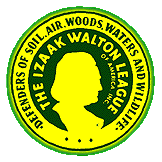

Walter J. Breckenridge Chapter
Izaak Walton League of America
Kicking Off the 2024-25 Scholarship Program
The Breckenridge Chapter has sent scholarship application materials to local schools and posted the 2024-25 application on our web site. This will be the twenty-sixth year our chapter has made scholarships available to high school seniors and/or current college undergraduates. Thus far 100 scholarships totaling more than $50,000 have been awarded to local students with a strong interest in, and a commitment to, environmental causes.
If you have questions regarding the scholarship program please contact
Jim Arnold (763-560-8972 or jjarnold@q.com).
About the W. J. Breckenridge Chapter
The Chapter was founded on the banks of the Mississippi just north of Minneapolis in 1932. Its first significant undertaking was halting a drainage project along the river. The Chapter House was built largely by volunteers four years later. Its fireplace contains stones from each of the 48 states in the Union at that time. The entire four acres around the chapter house remain in a natural state. In 1996 the name of the chapter was changed to the “Walter J. Breckenridge Chapter.” The Chapter House building and grounds are recognized as historically significant to the area. The Breckenridge Chapter purchased the island behind the chapter house from the University of Minnesota for $100.
We have a lot of fun while educating ourselves and others on environmental issues. We also help to conserve our natural resources and work towards a high quality of life for our children and future generations. Meeting on a regular basis, hunters, fishers, ecologists, conservationists and everyday people work together at the Chapter House towards conservation.
We partner with the Mississippi National River and Recreation Area - a part of the National Park Service.
A Different Kind of Environmental Group
The Izaak Walton League of America, frequently known as the "Ikes," is one of America's oldest conservation organizations. Founded in Chicago in 1922 by a group of anglers to form a plan of action to combat water pollution, the group takes its name from the 17th century author of the classic work, The Compleat Angler.
As you might guess from the story of our founding, the roots of the IWLA are deep in our outdoor heritage, having been founded by hunters and anglers. But we are not a "sportsmen's" group in the traditional sense. The difference is that although we work in areas as diverse as sustainable growth, public lands protection, wildlife issues, air and water pollution, and renewable energy, the IWLA, unlike some other environmental organizations, supports hunting and fishing. The point is this: if you're a hunter/angler who is concerned about broad environmental issues, we'd welcome you in the Ikes.
But make no mistake about it, we are first and foremost a broad based, broad interest environmental organization. To see just how broad our interests are, you need only visit our national headquarters' website. Many of our members don't hunt or fish — all Ikes share something else; IWLA members are bound together with a love for nature. We share the knowledge that we must be good stewards now, or we'll not be able to pass on to the next generation the natural riches that were bestowed upon us. Our history proves that point.
We don't focus on a single species of animal, bird or fish. The IWLA looks at the bigger picture, striving to protect the systems in which all creatures live. Long before the terms "biodiversity" and "ecosystem management" became common, the Ikes were fighting to protect whole watersheds, bioregions, air and water quality, and wildlife habitat. We're leaders in sustainability and environmental education, and are committed to working toward solid, workable solutions for protecting and enjoying our natural resources and the communities in which people live.
In addition to many active chapters in larger cities, the League has chapters in small and medium sized towns. Just as welcoming hunters and anglers helps to broaden our outlook, so do our numerous rural chapters provide important perspectives that are very beneficial in the increasingly complex debates on natural resource issues. Our diversity is a great asset.
Another great strength is that we are truly a grassroots organization. Unlike some conservation organizations where policy decisions are made from far away and then announced to members, the League’s structure is democratic. Each chapter creates policy. If we believe it is important enough to share with other Ikes, we pass it as a resolution, which is then voted on at our State Convention, a gathering of all chapter officers and representatives. Passed there, it becomes policy for the state, and can then be voted on at the National Convention. However, administration committees can, and occasionally do, sponsor resolutions independently of local chapters.
The policies that guide this organization were written by outdoors men and women, not by those inside the beltway, or who never set foot in the woods. That’s why the League is looked to for good, common sense, and forward looking solutions.